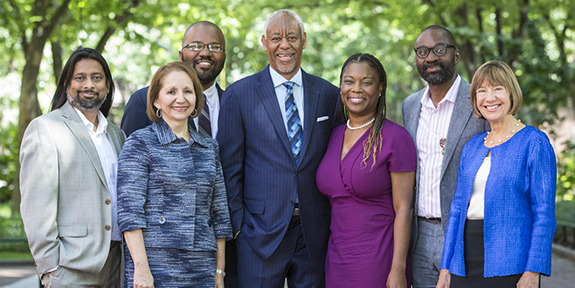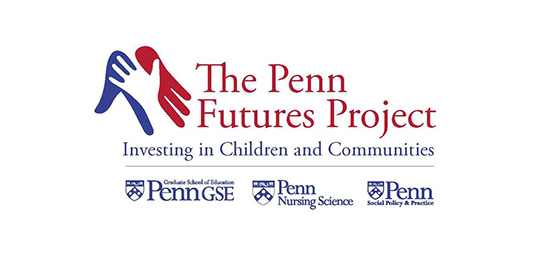Robert Wood Johnson Foundation Grant: Fellowships for the University of Pennsylvania’s Penn Futures Project

(Left to right) SP2 Calvin Bland Fellow Toorjo Ghose, Penn Nursing Dean Antonia Villarruel, Penn GSE Calvin Bland Fellow Ed Brockenbrough, Calvin Bland, Penn Nursing Calvin Bland Fellow Lisa Lewis, SP2 Dean John L. Jackson and Penn GSE Dean Pam Grossman.
The University of Pennsylvania established the Calvin Bland Faculty Fellowships for the Penn Futures Project. A $2 million endowment from the Robert Wood Johnson Foundation (RWJF) created a separate fellowship for each of the Penn Schools in the Penn Futures Project (PFP): the School of Nursing, the Graduate School of Education (GSE) and the School of Social Policy & Practice (SP2). The fellowships are named for Calvin Bland W’72, former RWJF chief of staff, health care executive and research professor at Rutgers University, whose scholarship and career have explored how to foster health equity across communities, with a specific emphasis on men and boys of color.
“Calvin Bland and the Robert Wood Johnson Foundation have enabled us to create genuinely multidisciplinary endowed fellowships that will support work addressing the complex, evolving challenges of at-risk populations—both now and far into the future,” said Penn President Amy Gutmann. “This is extremely important work for our society, and we are very grateful for the generous support that will make it possible.”
Research on At-Risk Populations
PFP has named three Calvin Bland Faculty Fellows: Ed Brockenbrough, associate professor in Penn GSE’s Teaching, Learning & Leadership division; Toorjo Ghose, associate professor at SP2 and founder of the Center for Carceral Communities; and Lisa Lewis, associate professor and assistant dean for Diversity and Inclusivity at Penn Nursing.
The Calvin Bland Faculty Fellowships are specifically designed to incentivize faculty to conduct research aimed at improving the lives of at-risk young men/boys of color and their families. Each fellowship will have a five-year term with specific research goals for the term. Grant funds will be used for research and research-related expenses, including convening conferences, lectures, seminars and other events to disseminate the research of the fellows, and helping fellows to publish work in scholarly and popular venues.
Mr. Bland initially approached Penn about opportunities to fund efforts to improve the lives of at-risk young men of color. His concerns paralleled the PFP’s efforts to more holistically deliver interventions to serve children and communities through established research, curriculum and other initiatives. Together, Mr. Bland and Penn developed the Bland Faculty Fellows to promote and reward multi-pronged, interdisciplinary approaches to issues facing at- risk young men of color.
“Placing fellows at each of the three Penn schools to work together to address the equity, health and well-being of at-risk young men of color will foster truly integrated approaches in education and research, which will then be more easily translated into the community,” Mr. Bland said.
“As this project started before I left the Foundation,” said Risa Lavizzo-Mourey, former RWJF president, “let me say that I and all my RWJF colleagues are excited to be funding this pioneering project in honor of a great Philadelphia son, inspirational leader and tireless mentor to many, Calvin Bland. In his work at the Foundation, and now in retirement, he continues to collaborate with RWJF to promote outstanding initiatives that build healthy communities, and break down obstacles in the pursuit of better health and quality of life.”
The Penn Futures Project: Investing in Children & Communities
The challenges facing marginalized youth and families are complex and extend beyond the boundaries of neighborhoods, school zones or health clinics. These include issues of violence and safety; poverty; mental health; access to quality health care and access to quality education. Yet the systems and organizations that serve this population operate largely in siloes that erect barriers to collaborative, comprehensive interventions. The professionals who serve children and families are educated largely in isolation from one another, despite decades of calls for high-quality, cross-disciplinary training. Children and families at greatest risk need not only the expertise of individual professionals, but also of professionals well-versed in collaboration. They also need collaborative and comprehensive solutions to address the complex and interwoven issues they face each day.
Launched in 2015, the PFP is an initiative driven by the Deans of Nursing (Antonia Villarruel); GSE (Pam Grossman); and SP2 (John L. Jackson) that seeks to bridge siloes to collaboratively generate knowledge, deliver solutions and develop future professionals ready to join forces to improve outcomes for marginalized youth and families.

